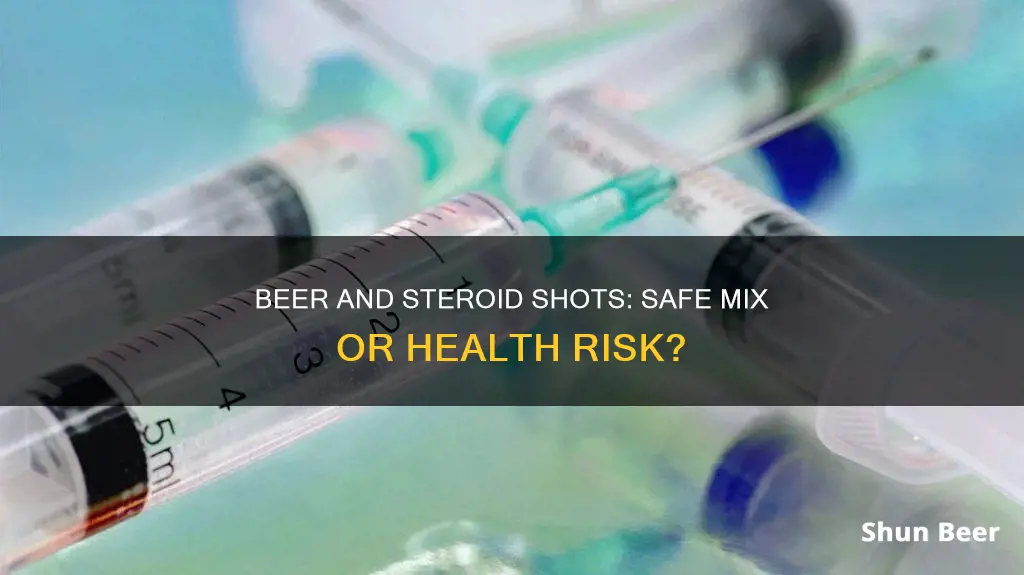
Drinking alcohol after receiving a steroid shot is generally not recommended as it can increase the risk of dangerous side effects. Both alcohol and steroids can suppress the immune system, making it harder for the body to fight off infections. Additionally, alcohol can worsen some of the side effects of steroids, such as gastrointestinal problems, weakened bones, and changes in blood sugar levels. It is important to consult a doctor before consuming alcohol while taking steroids to avoid any potential health complications.
| Characteristics | Values |
|---|---|
| Can you drink beer after a steroid shot? | It depends on the type of steroid. In the case of Prednisone, moderate alcohol use may be safe, but it is not recommended. For Hydrocortisone injections, alcohol can be consumed before and after. |
| Risks of drinking alcohol with steroids | Alcohol and steroids are both drugs that can have harmful, life-threatening effects on the body. When taken together, they can cause even more damage. |
| Factors to consider | Dosage of steroids, duration of treatment, frequency of alcohol consumption, and other medical conditions. |
What You'll Learn
- Alcohol and steroids can both suppress the immune system, making it harder to fight infections
- Drinking alcohol with steroids may increase the risk of stomach ulcers and bleeding
- Alcohol and steroids can each irritate the digestive tract
- Long-term steroid use may lead to cognitive difficulties and memory problems
- Alcohol and steroids can increase the risk of osteoporosis

Alcohol and steroids can both suppress the immune system, making it harder to fight infections
While there is no direct drug interaction between steroids and alcohol, mixing them is not recommended. Both substances can suppress the immune system, making it harder for the body to fight off infections.
Steroids are powerful medications that help relieve inflammation and swelling. They are often prescribed to treat autoimmune disorders, such as rheumatoid arthritis, by suppressing the immune system. This can help to calm symptoms, especially during flare-ups. Alcohol, on the other hand, is known to suppress the immune system when consumed in large quantities. According to the CDC, heavy drinking can increase the risk of sickness by impairing the immune system. Even occasional binge drinking can disrupt the immune system and make it easier for germs to cause infections.
When steroids and alcohol are combined, the risk of infection increases, and it becomes more challenging to recover from infections. This effect is especially pronounced in individuals who take steroids regularly or are older adults. Additionally, alcohol can worsen some of the side effects of steroids, such as changes in blood sugar levels, stomach irritation, dehydration, impaired wound healing, and the development of osteoporosis.
Therefore, it is generally advised to abstain from drinking alcohol while taking steroid medications. If you are considering consuming alcohol while on steroids, it is essential to consult your healthcare provider first. They can help assess your specific situation and determine if an occasional drink is safe for you.
Root Canal Recovery: Beer, Yes or No?
You may want to see also

Drinking alcohol with steroids may increase the risk of stomach ulcers and bleeding
While there is no direct drug interaction between steroids and alcohol, mixing them is not recommended. Alcohol can worsen some of the side effects of steroids, and it can also sometimes worsen the underlying condition being treated.
Prednisone, a common steroid, can increase the risk of gastrointestinal problems such as peptic ulcers and gastrointestinal bleeding. Symptoms of peptic ulcers can include stomach discomfort, indigestion, and heartburn. Alcohol in large amounts can also irritate the stomach lining. A short course of steroids can raise your risk of stomach ulcers and bleeding, and this risk goes up if you combine them with other things that irritate the stomach, like alcohol. On its own, alcohol can cause stomach ulcers and bleeding, especially when consumed in high amounts.
Nonsteroidal anti-inflammatory drugs (NSAIDs) and alcohol consumption have been proven to be independent risk factors for upper gastrointestinal (GI) bleeding. The risk of upper GI bleeding increases with the quantity of alcohol consumed. The use of aspirin, a common NSAID, increases the risk at all levels of alcohol consumption. With regular use, the relative risk for upper GI bleeding in alcohol consumers taking more than 325 mg of aspirin per day was 7.0.
Therefore, drinking alcohol with steroids may increase the risk of stomach ulcers and bleeding. It is advisable to consult a healthcare provider before consuming alcohol while on steroids to discuss potential side effects and drug interactions. It is generally recommended to avoid alcohol until treatment is completed.
Tooth Extraction: Beer Drinking and Recovery Time
You may want to see also

Alcohol and steroids can each irritate the digestive tract
While there is no direct drug interaction between steroids and alcohol, mixing them is not recommended. Alcohol can worsen some of the side effects of steroids, and both substances can irritate the digestive tract.
Steroids can irritate the lining of the stomach by inhibiting prostaglandins, which are substances that help protect the stomach lining. This irritation can lead to stomach ulcers. Oral steroids should be taken with food, and other drugs that irritate the stomach, such as nonsteroidal anti-inflammatory drugs (NSAIDs), should be avoided.
Alcohol can also damage the digestive tract in several ways. Firstly, it can impair the function of the muscles separating the oesophagus from the stomach, increasing the occurrence of heartburn. Alcohol can also damage the mucosal lining of the oesophagus, increasing the risk of oesophageal cancer. In the stomach, alcohol interferes with gastric acid secretion and the activity of the surrounding muscles. It may also impair muscle movement in the small and large intestines, contributing to diarrhoea. Additionally, alcohol inhibits the absorption of nutrients in the small intestine and increases the transport of toxins across the intestinal walls, potentially damaging the liver and other organs.
Both substances can irritate the digestive tract, and consuming them together may increase the risk of negative side effects. It is always best to consult a healthcare professional for advice on mixing medications and alcohol.
Flooded Beer Font: How Does It Work?
You may want to see also

Long-term steroid use may lead to cognitive difficulties and memory problems
Long-term steroid use has been linked to a range of side effects, including cognitive difficulties and memory problems. Steroid dementia syndrome describes the signs and symptoms of hippocampal and prefrontal cortical dysfunction, such as deficits in memory, attention, and executive function, induced by glucocorticoids. While the condition is typically reversible, it may not always resolve completely, and residual impairments may persist.
Research has shown that long-term steroid use can negatively impact memory performance, particularly in the ability to remember to perform future tasks (prospective memory) and to recall past events or facts (retrospective memory). In one study, steroid users exhibited a 39% higher rate of forgetting in terms of prospective memory and a 28% higher rate of forgetting in retrospective memory compared to non-users.
The hippocampus, a region of the brain critical for memory and learning, is particularly sensitive to the effects of steroids. Studies in rodents have shown that even a short course of steroid treatment can significantly alter the structure and function of the hippocampus, providing a potential explanation for the memory deficits observed in human steroid users.
Additionally, long-term steroid use has been associated with cognitive difficulties, including issues with concentration, academic or occupational performance, and executive function. These cognitive side effects may be misdiagnosed as separate conditions, such as attention deficit disorder (ADHD or ADD) in children or early-onset Alzheimer's disease in the elderly.
The mechanism underlying these cognitive difficulties and memory problems involves the down-regulation of glucocorticoid receptors (GRs) in the brain, known as the "glucocorticoid cascade hypothesis." This down-regulation diminishes neuroreparative activity and attenuates neurogenesis, resulting in decreased hippocampal volume with prolonged glucocorticoid exposure.
In summary, long-term steroid use has been consistently linked to cognitive difficulties and memory problems, with potential underlying neurological mechanisms providing insight into these observations. While the condition may be reversible, residual impairments may persist, underscoring the importance of understanding the risks associated with long-term steroid use.
Beer Diet: Does It Work?
You may want to see also

Alcohol and steroids can increase the risk of osteoporosis
Alcohol and steroids can have a detrimental effect on bone health, increasing the risk of osteoporosis.
Osteoporosis is a condition that weakens bones, making them more prone to fractures. It is estimated that over 30 million people in the United States suffer from osteoporosis. The condition arises when bones lose mass or mineral density, or when bone structure changes. People may not realise they have osteoporosis until they break a bone, usually in the hip, spine, or wrist.
Both alcohol and steroids can increase the risk of osteoporosis. Steroids such as prednisone are powerful medications that can suppress the immune system and reduce inflammation and swelling. They are often prescribed to treat autoimmune disorders, such as rheumatoid arthritis. However, long-term use of steroids can lower bone mineral density, increasing the risk of osteoporosis and bone fractures.
Alcohol can also negatively impact bone health and increase the risk of osteoporosis. Heavy alcohol consumption can prevent the absorption of calcium and vitamin D, which are essential for creating new bone cells. Alcohol can also cause hormone deficiencies in both men and women, leading to bone loss. Additionally, alcohol increases the risk of falling, which can result in bone fractures. Therefore, alcohol consumption, especially in excess, can exacerbate the risk of osteoporosis.
The combination of alcohol and steroids can further elevate the likelihood of developing osteoporosis. Both alcohol and steroids can suppress the immune system, so consuming them together can increase the risk of infection. Additionally, alcohol can worsen some of the side effects of steroids, including gastrointestinal problems, immune system suppression, bone weakening, and weight gain.
To reduce the risk of osteoporosis, it is advisable to limit alcohol consumption and refrain from drinking excessively. Maintaining a healthy diet rich in calcium and vitamin D, engaging in weight-bearing exercises, and avoiding smoking can also help promote bone health and lower the chances of developing osteoporosis.
The Magical Math of 79 Beers: Age Subtraction Mystery
You may want to see also
Frequently asked questions
It depends on the type of steroid shot. For example, you can drink alcohol before and after a hydrocortisone injection. However, it is not recommended to drink alcohol while taking prednisone or other corticosteroids.
Drinking alcohol while on steroids can increase the risk of dangerous side effects, including liver damage, high blood pressure, and aggressive behaviour. Both steroids and alcohol can suppress the immune system, making it harder for your body to fight off infections.
In some cases, moderate alcohol use may be safe with certain steroids, but it is always best to consult with a doctor first. Factors that may determine whether it is safe to drink include the dosage of the steroid, the length of the treatment, and how frequently the person consumes alcohol.
Steroids can have a range of side effects, including gastrointestinal problems, weakened immune system, changes in blood sugar levels, damage to the stomach and digestive tract, dehydration, impaired wound healing, osteoporosis, and pancreatitis.







